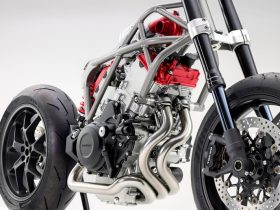
Is Ford as green as it says it is? CarNewsCafe set out to find out by interviewing David Berdish, Manager of Social Sustainability.
Ford’s Green Face.
The Ford took a sharp turn last decade by implementing processes to combat climate change, as well as using recycled materials in its production cars. Today, Ford cars are good looking, fun, and gas frugal. What we also discovered was that the company has a strict humanitarian code standard as part of their core business mission.
David Berdish Makes Ford Greener.
We met with David Berdish, Manager of Social Sustainability at Ford Motor Company to discuss how the company manages to be green and make a profit. Human rights and climate sustainability are not first the first things we think of with car manufacturers. Since Bill Ford stepped in as chairman in 1998, climate sustainability became an integral part of the company’s core business strategy to match 450 parts per million (PPM) of pollutants. We will discuss more on recycled materials in our upcoming article with Carrie Majeske, Manager, Product Sustainability at Ford.
Who Exactly is David Berdish?
David impressed us at the Ford Go Further event. He is full of life, compassion and humanity. David almost seems out of place in the automotive world, and he brings a human touch on car manufacturing. David was on the original team when Bill Ford challenged the company to follow a human rights code and says the company is the only carmaker today to enforce such code. Today, Ford ranks #1 by Corporate Responsibility Officer in 2010 and 2011 for human rights business practices.
David is not an engineer, but holds an MBA, as well as a Bachelors degree in Poetry and Statistics. His day starts with voracious reading, where he identifies emerging sociopolitical trends and predicts how they might affect the industry as a whole. Say a textile plant collapses in China, or there is child labor in South America, how does that effect Ford? How many women are slaves and victims of war throughout the world? Where does Ford get minerals for its components? How does Ford make sure its plants operate humanely and comply with its code of conducts? Those are just some of the things that fill David’s day. When he says he as the coolest job in the world, we believe him.
David says Ford still follows the tough human rights policies it set over a decade ago. Using its Letter Number 24 policy designed to ensure its employees enjoy the protection afforded by the principles articulated in this human rights policy. Ford strongly encourages its joint and tier one partners to implement such codes. David told us that if Ford finds any child labor use, illegal wages, or broken contracts, it will rescind contracts if the companies involved do not change their practices.
Summer Projects. David is proud of the Chennai hospital project, part of the Summer Project. This project uses Ford vehicles and its Cloud technology in Chennai, India to reach out to women who can’t get to hospitals to deliver. So far, they’ve reached 31,00 pregnant women and 54 villages, whom the government said wouldn’t have made it to the hospital. They have even delivered babies on site. This is David’s proudest accomplishment at Ford. Ford will continue another year to improve the process and reach more women in need. The system uses OpenXT, an open source system designed for medical and educational telecommunication that accesses Ford’s Cloud.
David told us how human trafficking affects businesses, including Ford’s. While governments put legislation in place to monitor situations, we still need to pay due diligence. According to David: “As a carmaker, it’s important to tie it all together, since some of the products these people produce can find its way into our cars.”
Asked what would be David’s ideal workplace in the automobile field, he replied: “I’d like to see what happened in 1903 when the Rouge plant was built in Dearborne. Ford paid $5 a day, which helped develop middle-class America there. Wall Street called him a socialist, but it sets forth a human rights trend” Ford now operates with a code that is part of the way it does business, backed by its Chairman. Sustainable mobility can be achieved with accessibility, even in the US where people have to have access to better food.
When carmakers concentrate on quality of work and life, human rights and sustainability, it can then create a better means of transportation. Is Ford truly as green and humane as it says? It surely seems so and shows you can make a profit in a humane way.







